China Media and Entertainment Weekly News Bulletin – ISSUE 75 Week of 3 November 2025
(1) Malaysian Rapper Namewee reports to police station after murder warrant issued in Taiwanese influencer’s death case
Malaysian rapper Namewee surrenders to KL police on murder warrant in Taiwanese influencer Iris Hsieh Yu-hsin’s hotel death. Namewee denied drug use or involvement in Hsieh’s death.
(2) Brigitte Lin desperately chased Wong Kar-wai for the script, Tops Weibo’s hot search list; Still Unaware of Her Role After Filming
Brigitte Lin’s 2018 clip of begging Wong Kar-wai for Chungking Express script tops Weibo; filmed blindly as assassin, thinking faded star—revives his no-script legend.
(3) No degree, no discussion? China tightens the grip on influencers and its new law has sparked massive debate online
China has enacted a new law requiring influencers to possess degrees or certifications for discussing serious topics like finance, health, and law online. This measure aims to combat misinformation and protect users from harmful advice. The Cyberspace Administration of China also banned medical product advertisements, marking a significant shift in online content regulation.
(4) Jay Chou’s Star Plus Legend Holdings Limited Steps In as Investor, Perfecting Galaxy’s Capital Framework for Its Korean IPO Drive
Galaxy Corp achieves H1 2025 sales of 126B KRW, profit 13B KRW, eyeing KOSDAQ 2026 listing. ADATA, Star Plus Legend invest $50M; Chou’s CHOUCHOU IP boosts global IP synergy.
(5) HK comedy legend Stanley Fung dies at 81, days after foretelling his death in tribute to Benz Hui
Veteran Hong Kong actor Stanley Fung Shui-fan passed away in Taiwan at age 81 after posting a heartbreaking Facebook tribute to his late colleague Benz Hui.
(6) Multiple celebrity Ashes Stolen from Po Fook Hill Cemetery
Po Fook Hill thefts target celebrity ashes, including Lau Kar Leung’s; widow Mary Jean Reimer confirms extortion attempt and refuses ransom. Police investigate Cambodia scam syndicate.
(7) ‘King of K-pop’ Lee Soo-man talks about China and the online bullying of K-pop stars
Lee Soo-man accepts “King of K-pop” title for Amazon documentary; pioneers global K-pop from SM, now innovates with A2O May in China/U.S., eyes Asia-Pacific as entertainment hub.
(8) Taiwanese artist Prince Chiu Issues Another Statement Apologising to Zack Fanchiang Couple: Will Face It Honestly Together with Meigo
Prince Chiu apologises again for Meigo’s affair, admits boundary cross during divorce talks, offers debt proof but rejects high compensation. Vows to face consequences with her; work suspended.
(9) Hong Kong police charge Joseph Lam, 15 others in HK$1.6 billion JPEX crypto case
Hong Kong police charged 16 people, including influencers Joseph Lam and Jacquelin Ch’ng Se Min, in the HK$1.6 billion JPEX crypto fraud; 80 arrested, HK$228 million seized, Interpol pursuing three fugitives.
(10) Charlene Choi hints at new romance and says she may go public “another day”
Charlene Choi, 42, teases new romance “another day” at event, amid rumors of dating fitness coach Elvis Lam. Spotted together; pet-sharing hints at co-parenting, months after denying reunion with ex Anthony Shek.
(11) Shu Qi Took to the Stage as Director of Girl to Thank the Audience
Shu Qi’s directorial debut Girl premieres in HK after Busan win. Husband Stephen Fung playfully teases her at Q&A, “did you ignore my advice,” sparking laughter and couple banter.
(12) Tokyo International Film Festival 2025: ‘Palestine 36’ wins top honour, Wang Chuanjun grabs best actor
Tokyo International Film Festival 2025 competition honors Zhang Lu’s Mothertongue (Best Director) and Wang Chuanjun (Best Actor); Ratanaruang’s Morte Cucina shines. Balances Asian arthouse with Kimura, Zhao amid regional auteur focus.
(1) Malaysian Rapper Namewee reports to police station after murder warrant issued in Taiwanese influencer’s death case

(Photo Credit: The Standard)
Malaysian rapper Namewee (Wee Meng-chee), 42, voluntarily reported to a Kuala Lumpur police station on November 5, 2025, after authorities issued seven arrest warrants in connection with the death of Taiwanese influencer Iris Hsieh Yu-hsin (31), known as the “nurse goddess” for her nursing background and looks. Hsieh was found dead in a hotel bathtub on October 22 while collaborating on a video project with Namewee. He posted on Instagram: “Just arrived from Johor Bahru to Kuala Lumpur… I have now arrived at the police station and will fully assist in the investigation… I won’t escape – I’ve voluntarily reported myself for all seven previous arrest warrants, never once fled.”
Namewee denied any involvement in Hsieh’s death, which police reclassified as murder on November 4, 2025, under Section 302 of the Penal Code, following new evidence like CCTV, staff records, and travel details. Initial reports suggested heart failure, but her family awaits full autopsy results, questioning findings. Namewee faces separate charges under the Dangerous Drugs Act for possessing 5.12 grams of suspected ecstasy (nine blue pills) and testing positive for amphetamine, ketamine, cannabis, and methamphetamine; he pleaded not guilty, was released on 8,000 ringgit bail, with a court date on December 18. He attributed recent heavier drinking to stress but denied drug use, awaiting the police report in 2-3 months.
Namewee’s compliance counters police fears of flight, buying time for his defence amid escalating scrutiny from Taiwan and Malaysia, where the case has fueled online speculation and blackmail attempts. As a satirical artist with a history of controversy, this high-profile probe risks derailing his career, especially with drug charges under strict Malaysian laws (up to life imprisonment). The murder upgrade, despite preliminary heart failure indications, highlights investigative rigor but raises questions about evidence thresholds, potentially straining bilateral relations if foul play ties to cross-border collaboration.
News Source: https://www.thestandard.com.hk/international-showbiz/article/315957/
(2) Brigitte Lin desperately chased Wong Kar-wai for the script, Tops Weibo’s hot search list; Still Unaware of Her Role After Filming

(Photo Credit: HK01)
Wong Kar-wai’s signature no-script, role-withholding style—creating constant buzz in superstar collaborations—resurfaced dramatically on November 7, 2025, as the hashtag “#BrigitteLinDesperatelyBegsWongKarwaiForScript” topped Weibo’s hot search. The viral resurgence stems from a 2018 Hong Kong International Film Festival clip where Brigitte Lin candidly detailed her bewildering experience on the 1994 classic Chungking Express, playing a mysterious blonde assassin without ever receiving a full script.
In the clip, Lin revealed that Wong never provided a full script—despite her repeated requests—and even when she finally got one, he said it wouldn’t be followed. “I finished the entire film without knowing what I was acting,” she laughed.
Lin shared that Wong initially told her she was playing a washed-up actress and suggested studying Vivien Leigh in A Streetcar Named Desire. She prepared accordingly, gradually adding a blonde wig, trench coat, heels, and sunglasses—believing these were disguises for a celebrity avoiding fame. It wasn’t until a scene where she suddenly held a gun that she realised something was off. “Wait—why am I holding a gun?” she recalled asking. Lin humorously concluded that Wong deliberately kept her in the dark, guiding her performance “bit by bit” so that even after filming wrapped, she still didn’t fully understand her character.
News Source: https://www.hk01.com/article/60290703?utm_source=01articlecopy&utm_medium=referral
(3) No degree, no discussion? China tightens the grip on influencers and its new law has sparked massive debate online

(Photo Credit: India Today)
China enacted a law effective October 25, 2025, requiring influencers to hold a degree in the topics they discuss in their content. The rule says that if you are an influencer and if you want to discuss “serious” topics such as finance, health, medicine, law or education, you must provide proof of relevant professional credentials. Enforced by the Cyberspace Administration of China (CAC) across platforms like Douyin, Weibo, and Bilibili, it also bans ads for medical products, supplements, and health foods to curb disguised promotions and misinformation.
Influencers must prove qualifications before posting regulated content, aiming to ensure informed discourse and accountability. The CAC defends it as protecting users from misleading content and harmful advice available online, with supporters on Weibo praising expert-led conversations: “It’s about time people with real expertise led the conversation.”
Critics argue the law stifles creativity and free speech, empowering authorities to gatekeep expertise: “Next thing you know, we’ll need a license to post opinions.” While reducing harmful misinformation, it risks silencing independent voices and critical debate, potentially reshaping China’s vibrant influencer ecosystem into a more controlled, credentialed space amid global concerns over online trust.
News Source: https://www.hk01.com/article/60289969?utm_source=01articlecopy&utm_medium=referral
(4) Jay Chou’s Star Plus Legend Holdings Limited Steps In as Investor, Perfecting Galaxy’s Capital Framework for Its Korean IPO Drive

(Photo Credit: HK01)
As a pioneer in the AI entertainment technology space, Galaxy Corporation delivered growth against the market tide in the first half of 2025: its sales hit 126 billion Korean won and net profit reached 13 billion Korean won. This marks a twofold increase in sales from the entire year of 2024, representing a pivotal shift from losses to profitability. Such a strong performance has significantly bolstered the company’s confidence and momentum in preparing for its 2026 listing on the KOSDAQ market—operated by the Korea Exchange (KRX). Currently, Galaxy’s valuation has surged to 1 trillion Korean won.
ADATA Technology, a giant in the storage industry, and Star Plus Legend Holdings Limited, joked as a “Jay Chou-concept stock” and listed on the Hong Kong Stock Exchange, successively announced in 2025 that the two parties had jointly injected 50 million US dollars into Galaxy through a fund, becoming its important strategic investors. Star Plus Legend specializes in IP creation and operations, with its core strength lying in building iconic celebrity-driven IPs. Centering on Mandopop superstar Jay Chou and renowned Chinese fitness coach Liu Keng-hung, the company has developed two flagship IPs: CHOUCHOU (Jay Chou’s official Nijgen-style personality) and Coach Liu.
Together with its broader IP portfolio, these two core IPs have amassed a cumulative fan base of 280 million, establishing Star Plus Legend as a formidable force in the global cultural entertainment industry. Since its launch in 2019, the CHOUCHOU IP has forged partnerships with over 200 brands worldwide, driving cumulative sales of authorized co-branded products to exceed RMB 1 billion. Star Plus Legend’s entry as a strategic shareholder of Galaxy is more than just a resource integration; it is a two-way empowerment of brand influence, poised to significantly elevate both entities’ global visibility and unlock a broader range of international collaboration opportunities.
News Source: https://www.prnewswire.com/apac/news-releases/star-plus-legend-holdings-limited-steps-in-as-investor-perfecting-galaxys-capital-framework-for-its-korean-ipo-drive-302601942.html
(5) HK comedy legend Stanley Fung dies at 81, days after foretelling his death in tribute to Benz Hui

(Photo Credit: The Standard)
On an early Saturday morning, veteran Hong Kong actor Stanley Fung Shui-fan, famous for his hilarious roles in the Lucky Stars series and hits like The Crazy Companies, was announced to have passed away in Taiwan, at age 81, stunning fans just four days after he posted a heartbreaking Facebook tribute to his late colleague Benz Hui Siu-hung that eerily predicted his own demise. The news broke like a thunderbolt in the entertainment world, especially since Fung had only recently mourned Hui, who succumbed to cancer on October 28 at 76.
That morning, upon learning of his friend’s passing through a message from Hui’s wife, Fung shared memories of their decades-long bond on social media, admitting he wasn’t entirely shocked due to earlier hints of Hui’s illness but deeply saddened that the younger man had gone first. Reflecting on their half-century friendship forged in Hong Kong’s golden age of cinema—marred by years of separation across borders—Fung revealed his own advanced age and grave health struggles, describing himself as barely hanging on.
He closed the post with a brotherly promise to Hui to follow him soon, a line that proved prophetically tragic when Fung’s death was announced, leaving longtime admirers of the star reeling in grief over the rapid loss of two comedy icons.
News Source: https://www.thestandard.com.hk/hong-kong-news/article/315698/
(6) Multiple celebrity Ashes Stolen from Po Fook Hill Cemetery
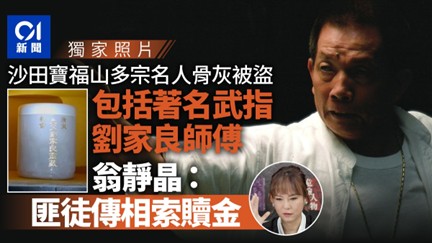
(Photo credit: HK01)
Multiple celebrity ashes have been stolen from Sha Tin Po Fook Hill Cemetery, including those of renowned martial arts director and actor Lau Kar Leung, as confirmed by his widow, Mary Jean Reimer, during her live YouTube show “Dangerous Person 2.0” on November 3, 2025. Reimer revealed that in late August, police informed her of the theft, showing photos of the stolen urn sent by thieves attempting extortion, which was intercepted by authorities. At least three high-profile urns were targeted, including Lau’s, with some families receiving ransom demands; the plot is suspected to involve a Cambodia-based scam syndicate.
Reimer, emotional during the broadcast, described initially mistaking the columbarium staff’s call for a scam, as Lau’s niche contained no valuables. Police verified the theft via photos, opening the large 15-slot niche to find only red and yellow cloths and Lau’s biography book—his two urns of ashes gone. Reimer suspects three or more perpetrators, as the heavy marble niche required scraping sealant and unscrewing to access, then resealing. She notified Lau’s siblings, first wife, and children before going public.
Reimer refused to pay a ransom, viewing payment as aiding criminals, and holds no hope for recovery of the ashes, treating Liu’s “sacrifice” like wartime donation. The case exposes vulnerabilities in Hong Kong’s columbaria security, potentially sparking reforms amid rising cross-border crime fears, while celebrities like Leslie Cheung, Lydia Sum Tin Ha, Roman Tam also rest at Po Fook Hill.
News Source: https://www.hk01.com/article/60291142?utm_source=01articlecopy&utm_medium=referral
(7) ‘King of K-pop’ Lee Soo-man talks about China and the online bullying of K-pop stars
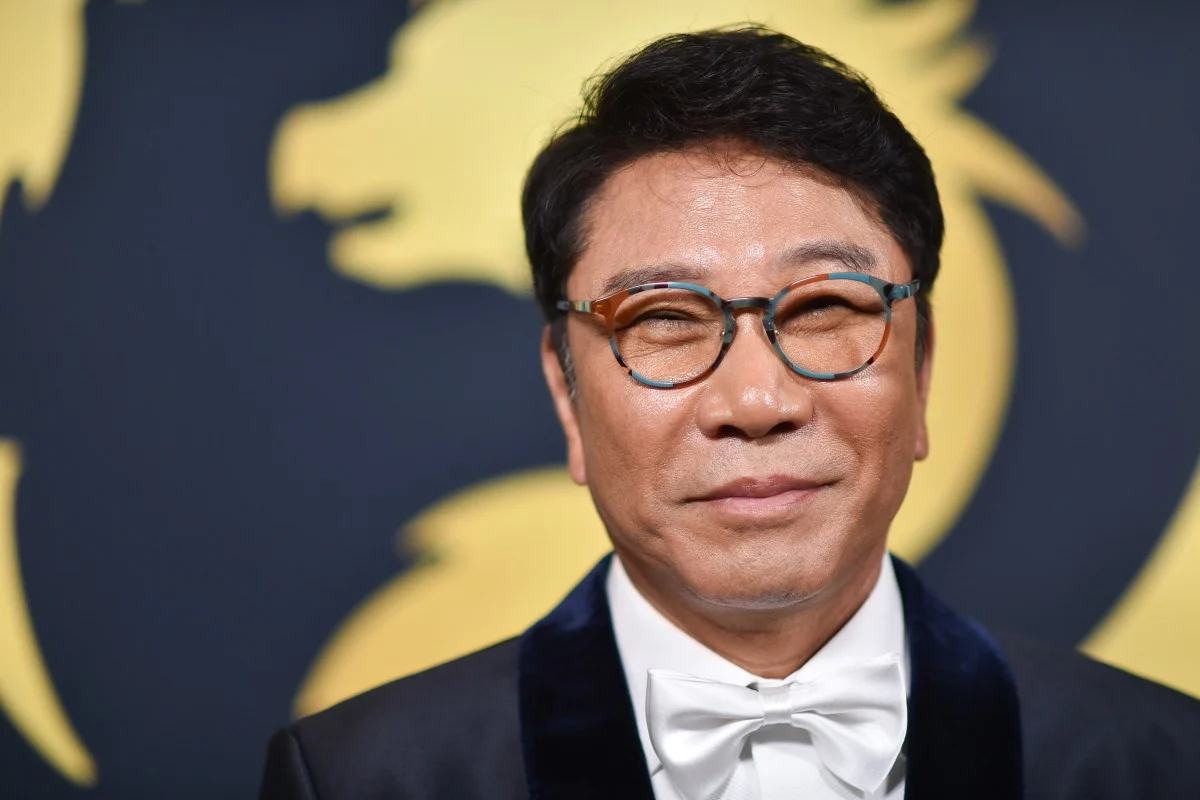
(Photo Credit: Richard Shotwell/Invision/AP)
Lee Soo-man, the 73-year-old founder of SM Entertainment, initially resisted the title “King of K-pop” for an Amazon Prime documentary about his career, deeming it overly flashy and suggestive of Seoul’s nightlife district Itaewon; he proposed “Father of K-pop” instead but ultimately relented to producers’ insistence that the bolder label would better resonate with American audiences, reflecting his pragmatic approach to breaking South Korean acts into the global mainstream.
Widely credited as the architect of K-pop’s global expansion, Lee was inducted into the Asian Hall of Fame alongside figures like Yao Ming and Yoshiki yet remains a controversial figure due to SM’s intensive training system for young recruits and past artist disputes over unfair contracts. His recent re-emergence follows a contentious departure from SM in 2025, marked by family feuds and share battles, though he continues to innovate with new groups like A2O May and investments in Chinese production technology.
Lee envisions South Korea as a global creative hub for producer training and sees the Asia-Pacific region as entertainment’s future center, leveraging his background in computer engineering to pioneer immersive “world views” for groups like Exo. His current focus on China and the U.S. with A2O May tests this vision despite Beijing’s restrictive policies, as he dismisses political risks and emphasizes aligning Korea’s production expertise with China’s soft power ambitions.
(8) Taiwanese artist Prince Chiu Issues Another Statement Apologising to Zack Fanchiang Couple: Will Face It Honestly Together with Meigo
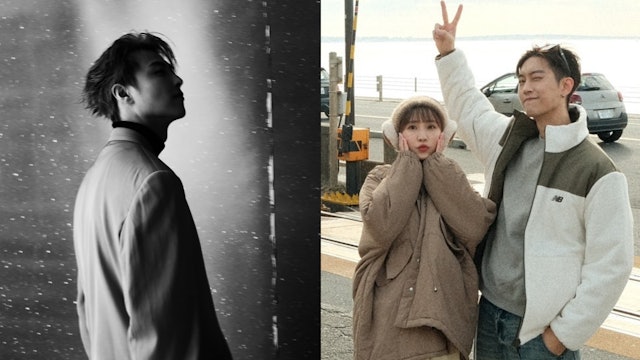
(Photo Credit: HK01)
Taiwanese celebrity Prince Chiu faced an affair scandal on October 30, 2025, when Zack Fanchiang accused him of an extramarital relationship with his wife Meigo during their marriage, offering evidence such as intimate photos to substantiate his allegations. Prince initially denied breaking up a family but admitted crossing friendship boundaries during Meigo’s divorce negotiations due to “excessive concern”. Meigo broke silence on November 1 with a 17-minute video refuting Fanchiang’s allegations of her being a gold digger. The feud escalated on November 4 with reports of nude hugging photos, leading Prince’s agency to suspend all his work, including a Shanghai concert cancellation.
On November 4 evening, Prince issued a lengthy apology on social media, stating: “Sorry, wrong is wrong, no reasons or excuses.” He revealed in-person bowing apologies to Fanchiang before the exposure and noted many reports were false, unsure how to clarify: “I really don’t know how to clarify, or if it’s necessary.” He detailed failed compensation talks, offering proof of past debt repayments for his father but facing demands exceeding his means, proposing installments that were rejected. Prince concluded: “I know mistakes require paying the price—this is what I deserve. All blame I won’t evade, and I’ll face it honestly together with Meigo and actively resolve it,” sparking speculation about announcing a relationship.
The statement, revised multiple times for sincerity, shifts from denial to accountability but fuels rumours of Prince-Meigo romance, amplifying public scrutiny amid Taiwan’s entertainment scandals. Fan’s evidence claims and Meigo’s counter-narrative highlight trust erosion in celebrity friendships, while work suspensions underscore reputational risks. As netizens debate “secondary harm” from rumours, the saga reflects broader issues of privacy invasion and mediation failures in high-profile divorces, potentially reshaping public sympathy toward the “victim” Fanchiang while pressuring Prince for transparency.
News Source: https://www.hk01.com/article/60291513?utm_source=01articlecopy&utm_medium=referral
(9) Hong Kong police charge Joseph Lam, 15 others in HK$1.6 billion JPEX crypto case
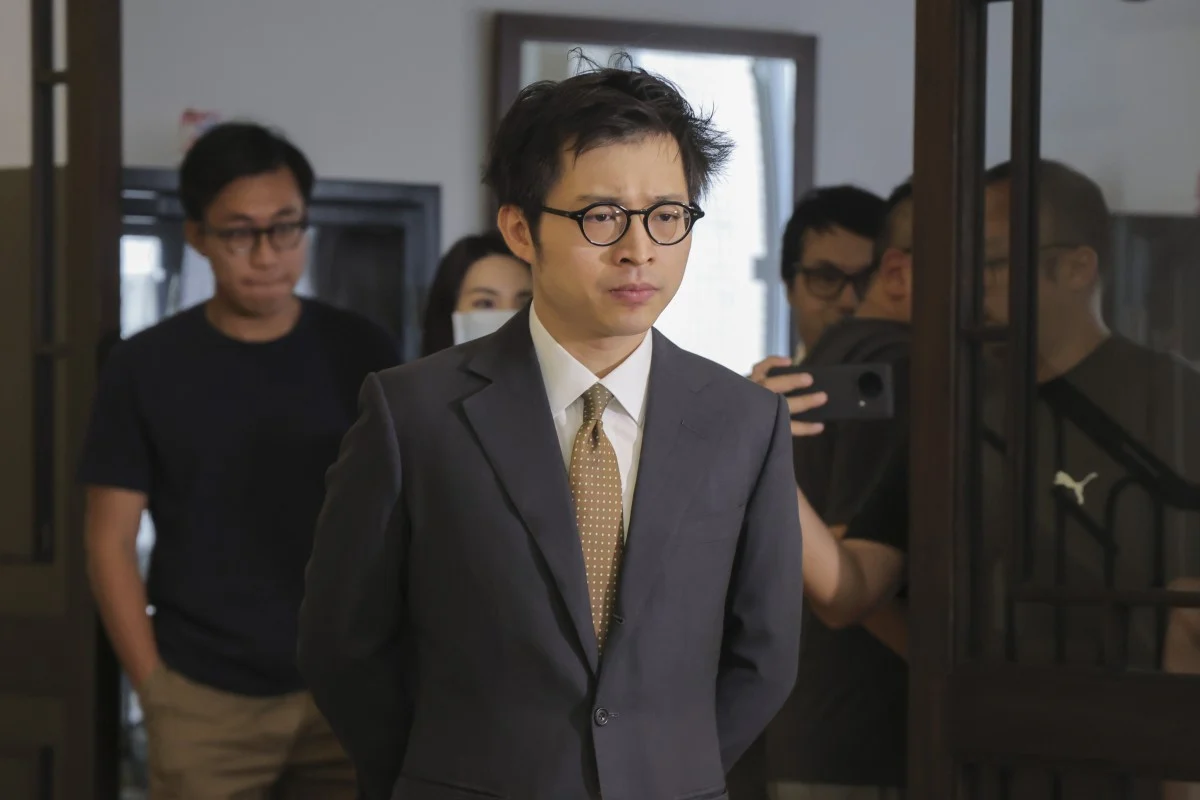
(Photo Credit: Jelly Tse)
Hong Kong police have charged 16 individuals in the HK$1.6 billion (US$205.8 million) JPEX cryptocurrency scandal, marking the city’s largest alleged financial fraud. The suspects, including influencer and former lawyer Joseph Lam Chok and another influencer Jacquelin Ch’ng Se Min face charges of fraudulently or recklessly inducing investments in virtual assets, conspiracy to defraud, money laundering, and perverting the course of justice under the Anti-Money Laundering and Counter-Terrorist Financing Ordinance—the first such prosecution. Six core members, seven influencers and OTC operators, and three stooge account holders are among those charged, with offenses carrying up to seven years’ imprisonment and HK$1 million fines. The 16 are scheduled to appear in Eastern Court on Thursday.
Since the investigation began in September 2023, 80 people have been arrested, including 14 core syndicate members, with HK$228 million in assets seized. Over 2,700 victims reported losses after JPEX, an unlicensed platform established in 2020, lured investors with promises of low-risk, high-return opportunities via advertisements, social media, and influencers. Following a 2023 warning from the Securities and Futures Commission, JPEX drastically raised withdrawal fees, trapping client funds. Police revealed that assets were transferred and laundered through numerous cryptocurrency wallets, with some suspects showing suspicious bank income, luxury car purchases, and holdings of large amounts of cash and gold bars.
The case remains ongoing, with Interpol issuing red notices for three fugitive Hong Kong masterminds—Mok Tsun-ting, 27; Cheung Chon-cheong, 30; and Kwok Ho-lun, 28—who fled before arrests. Chief Superintendent Ernest Wong described the probe as “highly difficult and complex” due to the volume of victims, transaction data, and need for digital forensics. Authorities continue to analyze evidence and have not ruled out further arrests, vowing to pursue the wanted trio for justice.
(10) Charlene Choi hints at new romance and says she may go public “another day”

(Photo Credit: Singtao Headline)
Charlene Choi, 42, has signalled that she may be in a new relationship, months after denying rumours of a reunion with former boyfriend Anthony Shek following their six-year romance. Appearing at an event on Wednesday, the Twins star suggested she could reveal more “another day”, fuelling speculation that she has started dating fitness coach Elvis Lam in recent months. The pair were reportedly spotted together at a Terence Lam concert, and Choi recently mentioned welcoming two “new family members” — Boo (a cat’s name) and Sesame (a dog’s name) — while Lam posted an Instagram photo holding Boo, hinting the duo may be co-parenting pets, with an official announcement seemingly a matter of time.
Pressed on whether she had a special someone to receive Christmas presents beyond her close girlfriends, Choi demurred, saying she wanted to keep a few secrets. When asked if this meant fresh developments in her love life, she playfully acknowledged the inference but stopped short of confirmation, adding that any disclosure would come in its own time rather than at yesterday’s engagement.
Reports suggest Choi and Elvis Lam have been seeing each other for several months and that the relationship is progressing well.
News Source: https://www.dimsumdaily.hk/charlene-choi-hints-at-new-romance-and-says-she-may-go-public-another-day/
(11) Shu Qi Took to the Stage as Director of Girl to Thank the Audience
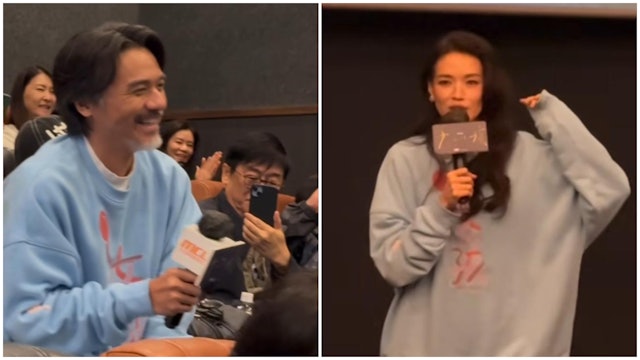
(Photo Credit: HK01)
Shu Qi’s directorial debut Girl premiered in Hong Kong on November 4, 2025, after winning Best Director at the 30th Busan International Film Festival. The actress-turned-filmmaker, who wrote and directed the film, credited “luck and timing” for the accolade, expressing confidence in her vision. At the post-screening Q&A, she thanked audiences in a packed theater filled with celebrity friends, including her husband Stephen Fung.
When Shu Qi invited questions, Fung playfully raised his hand first, calling her “Director” and asking: “Your film is so successful and won awards—is it because you didn’t listen to any of my suggestions?” The room erupted in laughter. Shu Qi fired back instantly: “Did you even give any suggestions?” Their light-hearted banter delighted the crowd, showcasing their chemistry.
Shu Qi concluded by sincerely thanking her crew—cinematographer, art director, and especially veteran stylist William Chang, saying, “Without him, the film wouldn’t look this good. I’m so fortunate to have so many people help me complete Girl.” The exchange with Fung not only humanised the star couple but also highlighted Shu Qi’s newfound authority as a director, blending warmth, wit, and gratitude in a celebratory moment for Hong Kong cinema.
News Source: https://www.hk01.com/article/60291809?utm_source=01articlecopy&utm_medium=referral
(12) Tokyo International Film Festival 2025: ‘Palestine 36’ wins top honour, Wang Chuanjun grabs best actor
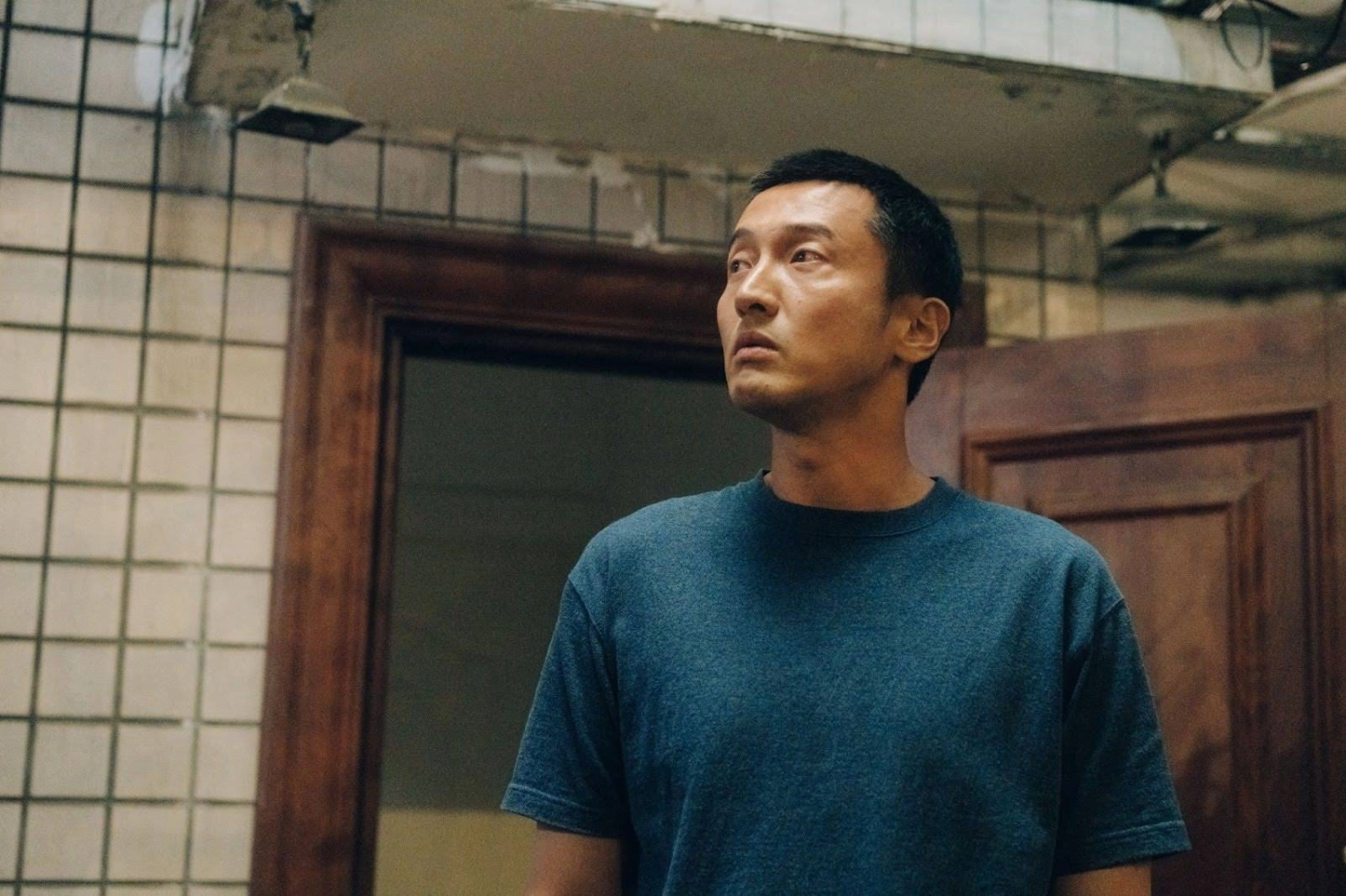
(Photo Credit: Mothertongue)
The Tokyo International Film Festival’s (“TIFF”) competition section showcased a diverse lineup, balancing high-profile entries like pop star-turned-actor Takuya Kimura’s latest work and Oscar-winning director Chloe Zhao’s film with Asian arthouse cinema. Standouts included Pen-ek Ratanaruang’s “Morte Cucina,” a subversive culinary-themed drama, and Zhang Lu’s “Mothertongue,” which earned him the Best Director award.
Ratanaruang’s “Morte Cucina” follows Sao, a Bangkok restaurant server with culinary ambitions, whose encounter with a real estate broker spirals into a tale of retribution and redemption. Reuniting with actor Tadanobu Asano and legendary cinematographer Christopher Doyle, the film combines lush visuals—emphasizing food preparation with almost mythic intensity—with a narrative that shifts from the mundane to the macabre, exploring themes of service, obsession, and transformation.
Zhang Lu’s “Mothertongue” traces a woman’s return to Chengdu after losing a film role due to dialect barriers, weaving a meditative urban parable on memory and connection. Bai Baihe’s detached performance and Piao Songri’s poetic cinematography elevate the simple narrative, while Wang Chuanjun’s TIFF-winning portrayal anchors a story of tentative relationships and fading cultural roots. The film solidifies Zhang’s status as a mature auteur, with its scriptless, exploratory style echoing Wong Kar-wai and resonating as a spiritual successor to his Berlin-premiered “The Shadowless Tower.”
Inevitably, an awkward romance begins to bloom between Chunshu and Dongdong as they embark on casual escapades, share meals and talk about language and memory. Wang Chuanjun scooped up TIFF’s best actor award for his stolid but sensitive portrayal of Dongdong, whose inner workings are somewhat easier to parse than the flighty yet deadpan Chunshu.
News Source: https://www.japantimes.co.jp/culture/2025/11/06/film/tiff-asian-arthouse-cinema/


